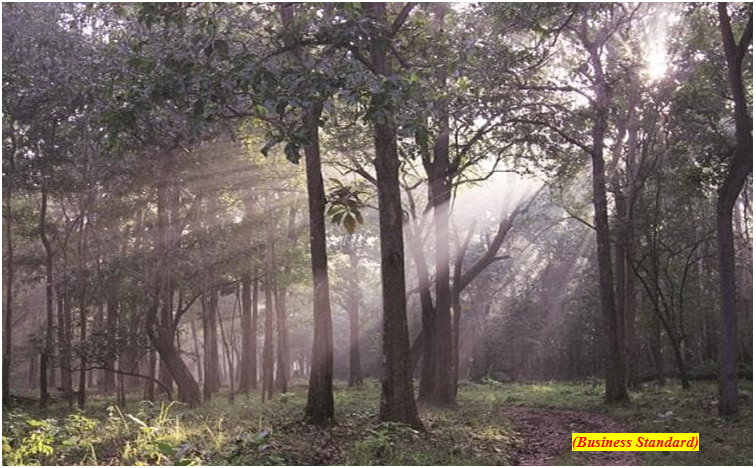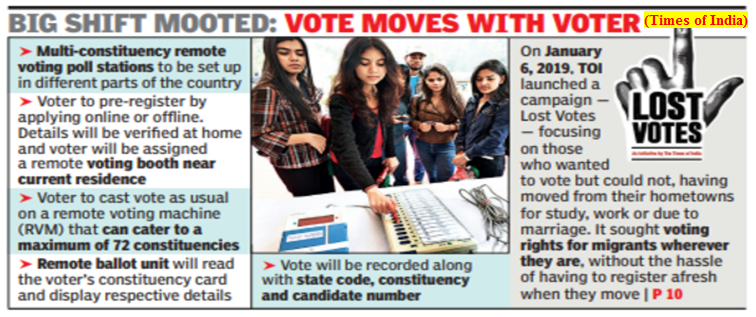NRDC undertook Technology Commercialization for benefit of Start Ups (GS Paper 3, Economy)

Why in news?
- Recently, the Ministry of Science & Technologysaid that beginning from 1st January, 2023, National Research Development Corporation (NRDC) will undertake Technology Commercialization for benefit of Start-Ups.
About NRDC:
- Established in 1953, National Research Development Corporation (NRDC) is a PSE, Section 8 Company under DSIR playing a pivotal role in bridging the R&D and Industry.
Roles:
- NRDC assists the Inter-Ministerial Board (IMB) of DPIIT for technically evaluating Start-ups for their recognition to avail benefits extended by Government of India and till date over 7500 applications of Start-ups have been assessed.
- NRDC is also associated with Indian Oil Corporation Limited (IOCL) for implementation of their Start-up Scheme from identification of start-ups and hand-holding to product launch.
- NRDC has entered into an MoU with The Agricultural and Processed Food Products Export Development Authority (APEDA) for mentoring and monitoring export oriented Agri-based Start-ups.
- Technology Development, Validation and Commercialization Program (TDVC) program is a Grant-in-Aid Scheme for providing financial support to start-ups, incubatees and MSMEs who focus on problem statements of the Indian society and manufacturing industry in the brick & mortar economy.
Boost for start-ups:
- NRDC provides seed funding against equity to eligible technology-based start-ups incubated in State/Central Government incubators. The start-ups have to demonstrate innovative and technology intensive development with strong commercial value.
- NRDC has taken up several initiatives to support and encourage the Start-Ups ecosystem in the Country. With this objective, NRDC has established and has started to manage incubation centers to nurture technology driven start-ups for maturation into commercial ventures.
NRDC Incubation Centre:
- The Corporation has created a physical and virtual space for incubating eight start-ups each who are working on novel solutions in the manufacturing industry space.
- These start-ups are being provided mentoring and hand-holding services, subsidized facilities for testing and fabrication at various networked laboratories, funding against equity, certification of incubation, Office and Conference facilities etc.
- It is a highly specialized start-up incubation facility created at CSIR-NAL Campus at Bengaluru in collaboration with CSIR-NAL and Foundation for Innovation and Social Entrepreneurs (FISE), Bengaluru (An initiative supported by Tata Trust) which was established and inaugurated in December 2021.
- This incubation facility encourages incubation of start-ups in the Aerospace and allied industry sectors.
Innovative Technology Enabling Center (InTEC):
- InTEC is a start-up incubation facility created at CSRI-IMMT Campus at Bhubaneswar which is now managed by the Corporation.
- This facility is for encouraging incubation of start-ups working in the area of materials, mining and allied industry sectors
India Australia Economic and Cooperation Trade Agreement comes into force
(GS Paper 2, International Relation)
Why in news?
- India has achieved the unique distinction of operationalizing two Trade Agreements in 2022. After the entry into force of India UAE Comprehensive Economic Partnership Agreement on May 1, the India-Australia Economic Cooperation and Trade Agreement (#IndAusECTA) has come into effect from today, i.e., December 29, 2022.
- The ECTA was signed on April 2, 2022, ratified on November 21.

Key Highlights:
Indian goods on all tariff lines to get access to Australian market with zero customs duty:
- The Ind-Aus ECTA provides an institutional mechanism to encourage and improve trade between the two countries. It covers almost all the tariff lines dealt by India and Australia.
- India will benefit from preferential market access provided by Australia on 100% of its tariff lines, including all the labour-intensive sectors of export interest to India, such as Gems and Jewellery, Textiles, leather, footwear, furniture, food, and agricultural products, engineering products, medical devices and Automobiles.
- On the other hand, India will be offering preferential access to Australia on over 70% of its tariff lines, including lines of export interest to Australia, which are primarily raw materials and intermediaries such as coal, mineral ores and wines.
Services:
- As regards trade in services, Australia has offered wide-ranging commitments in around 135 sub-sectors and Most Favoured Nation (MFN) status in 120 sub-sectors covering key areas of interest to India.
- On the other hand, India has offered market access to Australia in around 103 sub-sectors and Most Favoured Nation status in 31 sub-sectors from the 11 broad service sectors such as ‘business services’, ‘communication services’, ‘construction and related engineering services’, and so on.
- Both sides have also agreed to a separate Annex on Pharmaceutical products under this agreement, which will enable fast-track approval for patented, generic and biosimilar medicines.
- It is estimated that an additional 10 lakh jobs would be created in India under ECTA. Indian Yoga teachers and chefs are set to gain with the annual visa quota. Over 1 lakh Indian students would benefit from post-study work visa (for 18 months to 4 years) under the ECTA.
- The agreement is also likely to increase investment opportunities, promote exports, create significant additional employment and facilitate strong bonding between the two countries.
India-Australia:
- Australia is an important strategic partner of India. They are also part of the four nation QUAD, Trilateral Supply Chain Initiative and the Indo-Pacific Economic Forum (IPEF).
Tribal economy set to get a fillip Madhya Pradesh govt notifies PESA Act
(GS Paper 3, Economy)
Why in news?
- To strengthen the tribal economy, the Madhya Pradesh government recently notified the Panchayats Extension to Scheduled Areas (PESA) Act.

Background:
- According to the state government estimates, about 3.7 million people are associated with minor forest produce collection work. Of this, more than 50 per cent belong to the tribal community.
- To protect this minor forest, produce collectors from exploitation by middlemen, the state government has recently implemented the PESA Act.
Benefits it will offer:
- With the aim of providing proper benefits from the collected minor forest produce, collection and trading in the state will now be done through the Gram Sabha.
- The Madhya Pradesh Minor Forest Produce Association is also working to provide proper remuneration to the forest dwellers and villagers for the collection of nationalised forest produce.
- Through its 1,066 primary forest produce cooperative societies and 60 district forest produce cooperative unions, the union is doing small forest produce collection work. It is also providing employment as well as processing, storage and marketing of medicinal and aromatic plants.
International Van Mela:
- Every year, the state government organises the International Van Mela (International Forest fair), where diversified forest products are showcased.
- In Van Mela 2022 (which ended on December 26), forest products worth Rs 3 crore were sold.
- Pacts worth Rs 28 crore were also signed during the fair, which is double compared to last year.
Future plans:
- The efforts are being made to remove middlemen from buyer-seller interaction. This will allow forest produce collectors to directly connect with big institutions and get better prices for their produce.
- The state government is planning to make products such as Chyawanprash and chocolate from forest produce like Mahua.
About PESA Act:
- To bring the people residing in Fifth Schedule Areas in the mainstream, the Parliament, in terms of Article 243M(4)(b) of the Constitution, has enacted “the Provisions of the Panchayats (Extension to the Scheduled Areas) Act, 1996” (PESA) to extend Part IX of the Constitution, relating to Panchayats, to the Fifth Schedule areas, with certain modifications and exceptions. States, having Fifth Schedule Areas, have been empowered to make Panchayat Laws for these areas.
- Under “The Provisions of the Panchayats (Extension to the Scheduled Areas), Act 1996” (PESA), State Legislatures have been empowered to frame all laws concerning the extension of the provisions of Part IX of the Constitution relating to the Panchayats in Fifth Scheduled Areas, subject to such exceptions and modifications as are provided in section 4 of the Act.
- PESA is an Act to provide for the extension of the provisions of Part IX of the Constitution relating to the Panchayats to the Scheduled Areas.
- In terms of section 2 of this Act, “Scheduled Areas” means the Scheduled Areas as referred to in clause (1) of article 244 of the Constitution. Out of the ten PESA States, eight States namely; Andhra Pradesh, Chhattisgarh, Gujarat, Himachal Pradesh, Maharashtra, Madhya Pradesh, Rajasthan and Telangana have framed and notified their State PESA Rules under their respective State Panchayati Raj Acts.
Remote EVM ready to help migrants vote outside States EC
(GS Paper 2, Governance)
Why in news?
- The Election Commission (EC) announced the development of a prototype of a multi-constituency remote electronic voting machine (RVM) to enable remote voting by migrant voters.
- The machines can handle multiple constituencies from one remote booth.

Causes for lowvoter turnout:
- The voter turnout in General Elections of 2019 was 67.4% and the Election Commission is concerned about the issue of over 30 crore electors not exercising their franchise and also differential voter turnout in various States/Union Territories.
- The EC noted there were multifarious reasons for a voter not opting to register in a new place of residence, thus missing out on exercising the right to vote.
- The inability to vote due to internal migration is one of the prominent reasons to be addressed to improve voter turnout and ensure participative elections.
- Out-migration due to the need to work, marriage, and education is predominant among the rural population in overall domestic migration. Approximately 85% of the internal migration is within the States.
Voter portability:
- The idea was to implement voter portability as a pilot project in the Assembly elections in nine States in 2023.
- If the pilot is successful, then voter portability can be fully implemented in the 2024 Lok Sabha election.
Concept note:
- The EC said it had circulated among the political parties a concept notehighlighting the challenges of defining domestic migrants, implementation of the Model Code of Conduct, ensuring secrecy of voting, facility of polling agents for identification of voters, process and method of remote voting and counting of votes and other issues.
- Among the laws and rules that would need amendment to implement remote voting are the Representation of the Peoples Act of 1950 and 1951, the Conduct of Election Rules, 1961 and the Registration of Electors Rules, 1960.
Migrant voters:
- The definition of migrant voter will also need to be reworked with respect to retaining registration at the original place in the context of the legal construct of “ordinary residence” and “temporary absence”.
- Also, the territorial constituency concept of remote voting and defining remoteness itself, that is an outside constituency, outside district or outside State will need to be dealt with.
Administrative challenges:
- The administrative challenges include enumerating remote voters’ self-declaration, ensuring secrecy of voting at remote locations, provision of polling agents at remote voting booths, and ensuring identification of voters to avoid impersonation.
- Other areas to work on would include the appointment of polling personnel for remote polling stations and supervision thereof, the number of polling booths to be set up and their locations, and implementation of the Model Code of Conduct in remote locations.
- Some of the technological challenges will be the method of remote voting, the familiarity of the voters with the multi-constituency RVM and counting of votes.
RVM:
- The EC said it was now ready to pilot an RVM with a public sector undertaking. This modified form of EVM can handle up to 72 multiple constituencies from a single remote polling booth.
- The initiative, if implemented, can lead to a social transformation for the migrants and connect with their roots as many times they are reluctant to get themselves enrolled at their place of work for various reasons such as frequently changing residences, not enough social and emotional connect with the issues of an area of migration, and unwillingness to get their name deleted in the electoral roll of their home/native constituencies as they have permanent residence/property.
What’s next?
- The EC invited all recognised political parties; eight national and 57 State parties to a demonstration of the prototype on January 16.
- The panel has already shared a concept note with them on the legal, operational, administrative and technological challenges. The commission urged the parties to submit their views by January 31.





